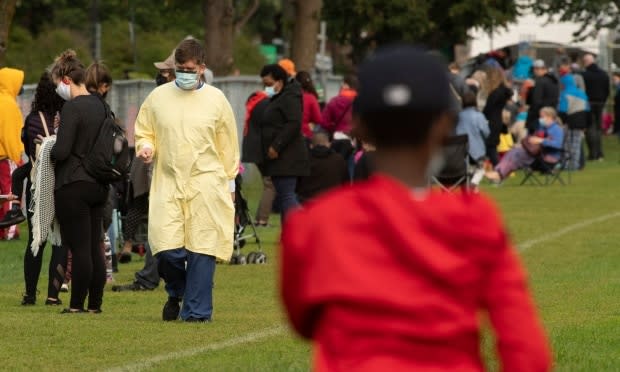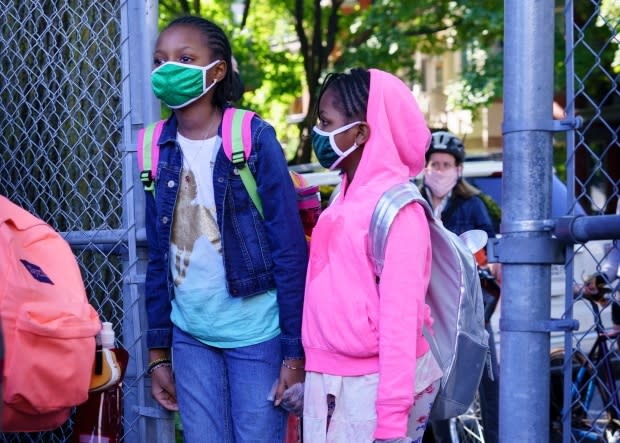What you need to know about COVID-19 in Ottawa on Sunday, Oct. 4

Recent developments:
Ottawa Public Health is reporting 82 cases of COVID-19 on Sunday but no new deaths.
Ottawa's Boys and Girls club says cases of COVID-19 have forced the closure of the Ron Kolbus clubhouse on the city's west side. The organization says six people who were recently in the space have tested positive.
Four new cases of the virus were reported in Kingston, Ont., Saturday afternoon. The region has seen 147 cases since the start of the pandemic.
What's the latest?
As of today, walk-in COVID-19 testing services across Ontario will be paused as the province transitions to an appointment-only model set to begin Tuesday.
That step's being taken so that labs can deal with a backlog of tests that rose above 90,000 on Friday.
A variety of new restrictions targeting bars, restaurants, event spaces and gyms are now in place in Ottawa, Toronto and Peel Region.
Those three regions have been dealing with a recent surge in COVID-19 cases. In the nation's capital, 82 new cases were confirmed on Sunday.
How many cases are there?
As of the most recent Ottawa Public Health (OPH) update on Sunday, 4,708 Ottawa residents have tested positive for COVID-19.
That includes 810 known active cases, 3,605 resolved cases and 293 deaths.
Overall, public health officials have reported more than 7,100 cases of COVID-19 across eastern Ontario and western Quebec, with nearly 5,600 of those cases considered resolved.
COVID-19 has killed 104 people in the region outside Ottawa: 52 people have died in Leeds, Grenville and Lanark counties, 34 in the Outaouais and 18 in other parts of eastern Ontario.
What's open and closed?
Health officials are telling people to see fewer people in person, or stricter rules will force them to.
Ottawa's medical officer of health issued a dire warning to residents Friday, saying the entire health-care system is on the verge of collapse if individuals don't take personal responsibility to slow the spread of COVID-19.
As of Monday, visitors to long-term care homes in Ottawa will be restricted to staff, essential visitors and one or two caregivers only.
Ottawa and Kingston, Ont., public health officials are ordering anyone with symptoms or who has been identified as a close contact of someone who's tested positive to immediately self-isolate or face a fine of up to $5,000 per day in court.
Kingston has also tightened its distancing rules in city parks and increased fines.
WATCH | Banquet hall owner reacts to premier's new restrictions:
Ontario is putting the concept of social circles on pause, and advising people to limit close contact only to those living in their own household. People who live alone may consider having close contact with another household.
In western Quebec, the health unit says residents need to stop gathering until the end of October or, like Montreal and Quebec, it will raise the alert level to the highest one possible and people won't be allowed to see anyone they don't live with.
The region is currently on orange alert, which means private and organized gathering limits, earlier closing hours for restaurants and recommendations against travelling to other regions.

What about schools?
There have been nearly 120 schools in the wider Ottawa-Gatineau region with a confirmed case of COVID-19 in a staff or student, most of them in Ottawa.
Not all of them have had outbreaks, which are declared by a health unit in Ontario when there's a reasonable chance someone who has tested positive caught COVID-19 during a school activity.
Many school boards have a list of affected schools:
Ontario updated its COVID-19 screening protocols for children last week, no longer telling them to isolate and get tested if their only symptom is a runny nose, headache, sore throat, fatigue or diarrhea.
They'll still be asked to stay home, but can return after at least 24 hours if they feel better.
Some health units tweak the province's guidelines, so check with the unit in your area. OPH says it will use the province's rules.
Distancing and isolating
The novel coronavirus primarily spreads through droplets when an infected person coughs, sneezes, breathes or speaks onto someone or something.
People can be contagious without symptoms.
This means people should take precautions like working from home, keeping hands and frequently touched surfaces clean, socializing outdoors as much as possible and maintaining distance from anyone you don't live with — even when you have a mask on.
Masks are mandatory in indoor public settings in all of Ontario and Quebec, including transit services and taxis in some areas. They're recommended outdoors when people can't stay the proper distance from others.
Health Canada recommends older adults and people with underlying medical conditions and/or weakened immune systems stay home as much as possible.
Anyone who has travelled recently outside Canada must go straight home and stay there for 14 days.
Most people with a confirmed COVID-19 case in Quebec can end their self-isolation after 10 days if they have not had a fever for at least 48 hours and has had no other symptom for at least 24 hours.
What are the symptoms of COVID-19?
COVID-19 can range from a cold-like illness to a severe lung infection, with common symptoms including fever, a cough, vomiting and the loss of taste or smell.
Less common symptoms include chills, headaches and pink eye. Children can develop a rash.
Getting tested any sooner than five days after potential exposure may not be useful since the virus may not yet be detectable, says OPH.
If you have severe symptoms, call 911.

Where to get tested
The Ontario government recommends only getting tested if you have symptoms, or if you've been told to by your health unit or the province because of your work.
Ontario health officials have said they're trying to add more capacity, as the backlog of tests at the province's labs had blossomed to more than 90,000 as of late last week.
Walk-in tests are being halted as of Sunday, and anyone seeking a test will require an appointment as of Tuesday.
Bear in mind that some of the following test sites may be transitioning to the new model over the next couple of days.
In eastern Ontario:
Most of Ottawa's testing happens at one of four permanent sites, with additional mobile sites wherever demand is particularly high.
A test clinic is expected to open at the Ray Friel Recreation Complex in Orléans, likely by mid-October.
People without symptoms, but who are part of the province's targeted testing strategy, can make an appointment at select Ottawa pharmacies.
In the Eastern Ontario Health Unit, the drive-thru test centre in Casselman will close tomorrow and relocate to Limoges on Wednesday. The Limoges drive-thru centre, which normally operates seven days a week, will be closed Sunday and Monday.
The health unit also has sites in Hawkesbury, Alexandria, Rockland, Cornwall and Winchester.
In Kingston, the city's test site is now at the Beechgrove Complex near King Street West and Portsmouth Avenue.
Saturday was its final day for walk-in testing, but people can schedule appointments there on Sunday and Monday. An online booking system will launch Tuesday.
Napanee's test centre is open daily for people who call ahead.
People can arrange a test in Bancroft, Belleville, Picton or Trenton by calling the centre. Only Belleville and Trenton run seven days a week and also offer online booking.
The Leeds, Grenville and Lanark health unit is operating sites this weekend in Brockville, Smiths Falls and Almonte.
The Brockville site is transitioning to the new model Sunday, but the health unit says people who meet the testing criteria can still show up and will likely be given an appointment later in the day.
The other two sites are by appointment only.

Renfrew County residents should call their family doctor. Those without access to a family doctor can call 1-844-727-6404 for a test or if they have health questions, COVID-19-related or not.
People can also visit the health unit's website to find out where testing clinics will be taking place each week.
In western Quebec:
Outaouais residents can make an appointment in Gatineau seven days a week at 135 blvd. Saint-Raymond or 617 avenue Buckingham.
They can now check the approximate wait time for the Saint-Raymond site.
There are recurring clinics by appointment in communities such as Gracefield, Val-des-Monts and Fort-Coulonge.
They can call 1-877-644-4545 if they have other questions, including if walk-in testing is available nearby.
Tests are strongly recommended for people with symptoms or who have been in contact with someone with symptoms. People without symptoms can also get a test.
First Nations, Inuit and Métis:
Akwesasne has had 14 confirmed COVID-19 cases, most linked to a gathering on an island in July.
It has a mobile COVID-19 test site available by appointment only.
Anyone returning to the community on the Canadian side of the international border who's been farther than 160 kilometres away — or visited Montreal — for non-essential reasons is asked to self-isolate for 14 days.
Inuit in Ottawa can also call the Akausivik Inuit Family Health Team at 613-740-0999 for service, including testing, in Inuktitut or English on weekdays.
People in Pikwakanagan can book an appointment for a COVID-19 test by calling 613-625-2259.
Anyone in Tyendinaga who's interested in a test can call 613-967-3603 to talk to a nurse.
For more information


